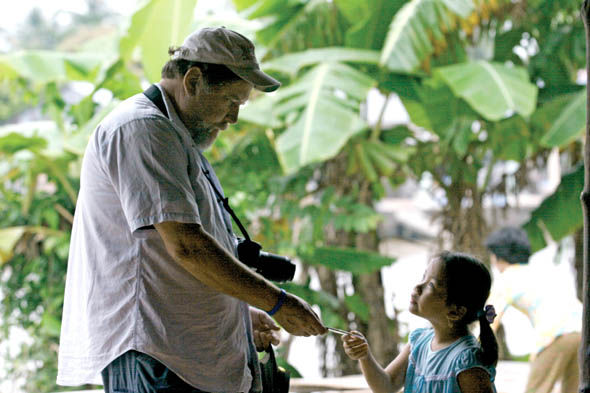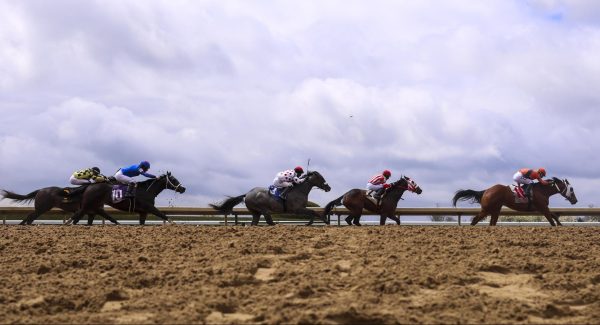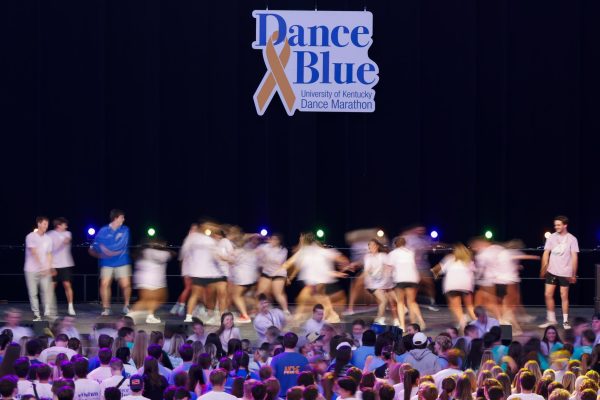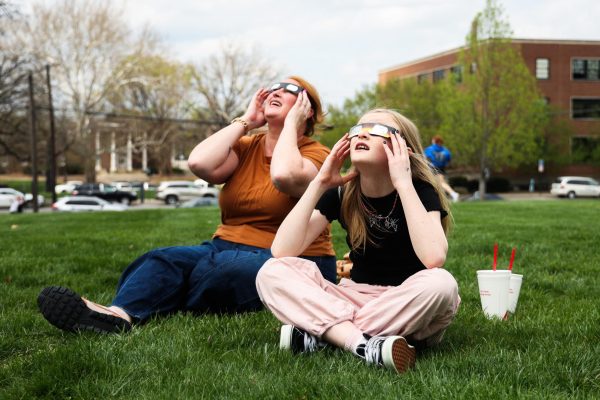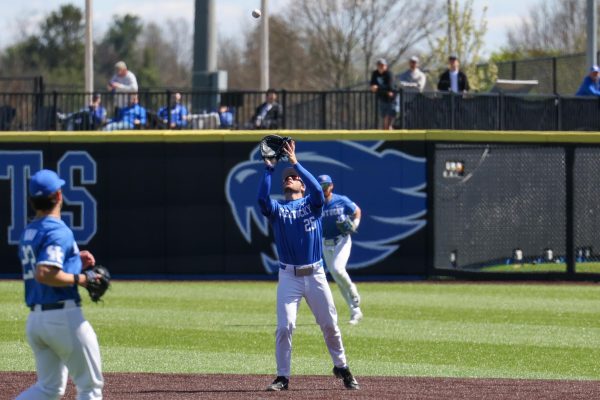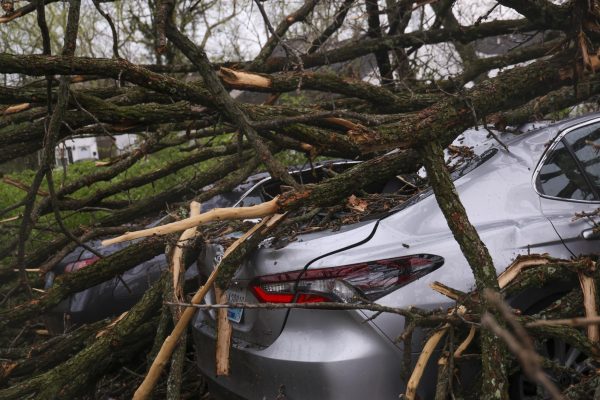Bridging past and present
April 25, 2008
Nearly 40 years after Berres stepped off a troop cargo plane to start his tour of duty, the former soldier knelt at a pew in a Catholic church in Hanoi. Vietnamese choirs echoed through the packed Christmas night service with a familiar melody of “O Come All Ye Faithful.â€This December 2007 visit was Berres’ second time returning to the formerly embattled country since his service – and his first time bringing UK students.Berres, 58, now an assistant dean for admissions and student affairs in the College of Health Sciences and a political science instructor, started teaching a Vietnam War history class as part of the Discovery Seminar Program a year ago with hopes of bringing students to Vietnam – a place more often thought of as a war rather than a country.The United States did not learn lessons from the war, Berres said. Questions that should have been examined at the war’s end were stepped over in America’s rush to distance itself from the conflict.The result, Berres said, is another preemptive war based on false information, this time in Iraq.Berres gained a tragic perspective from witnessing the brutality of combat in Vietnam. The majority of the country – including the current White House administration and much of Congress – did not.The lessons overlooked by politicians and citizens of the Vietnam era are what Berres hoped students would take to heart by visiting the country.So many matters of foreign policy are essentially human decisions, Berres said, and so many Americans are unaware of the total cost of war.The Christmas service was spoken in Vietnamese, but Berres told students the language barrier made no difference. Growing up in a Catholic home, Berres considered being a priest. The same motivations drove him to join the Army; it was a chance to serve not only his country, but all of mankind.
Two students joined the professor on the wooden pew, sitting at his left. An older Vietnamese woman sat on his right. Thirty-five years earlier U.S. bombs rained down on Hanoi for 11 straight days and nights, including Christmas, as part of one of the last major American bombing campaigns of the war. Berres could not help but wonder about the woman’s story – the hardships she might have faced, whom she lost at the hands of Americans.
“I think I spent almost the entire time looking at those beautiful women and children and thinking to myself, how could we have bombed the hell out of these people 35 years ago almost to the day?†Berres said. “Just looking at them – how innocent and sweet, gracious, beautiful they are – and wondering how we could have rained all those bombs down on them and found some way to justify it.â€
A new soldier on an old battlefield
Nothing in the Vietnam of 1968 was as it seemed.
Berres was trained on how to stay alive in combat, told of America’s local allies in the Army of South Vietnam and indoctrinated on the evils of communism, as he had been since childhood. Helping South Vietnam fend off the communist North was the reason for the war, soldiers and the nation were told.
What the young soldier found in the country was strikingly different.Combat was chaos, where luck was often more valuable than training. The South Vietnamese had no cause to believe in – like the United States, their soldiers were drafted. To many Vietnamese, communism was simply a word.
The difference between Northern and Southern Vietnamese was largely artificial. Until 1954, Vietnam was a unified country that had been fighting against foreign invaders nearly its whole existence: thousands of years against the Chinese and nearly a hundred years against the French. The recent decades since America’s withdrawal represent the longest period of peace Vietnam has ever experienced.
Given the choice of joining the national army, going to jail or joining the Viet Cong and putting their families at risk, the South Vietnamese were simply “on the wrong side of their own history.â€
“I thought it was a clean divide,†Berres said, laughing. “The good guys and the bad guys, the communists and the non-communists. Nothing is that clean.â€
“They are victims of circumstances, and the fact that they wore that uniform and worked with the United States does not suggest to me for a second that they were all about democracy or the Americans supporting government or us winning or anything like that,†Berres said. “They were simply trying to survive.â€
The peak of this mountain of contradictions was the Tet Offensive. Berres arrived in the country at the beginning of the sweeping, organized communist attack in South Vietnam. Similar to the insurgency of Iraq today, the enemy could be anywhere and could be undistinguishable from civilians.
But Berres was a new soldier. He was still approaching his radicalization.He still believed in the cause and had even opted to skip a year of language training to speed his arrival, not wanting to risk that the war might end before he experienced it.One immediate contradiction was apparent to him, however. Leaving America, Berres was a fully trained Army interrogator. To soldiers already in the field, he was just an FNG, a “f—ing new guy,†a soldier whose life was worth the least of anyone’s, given more dangerous assignments and the “s— jobs.â€
But of all the realizations Berres would have over the next year, the most lasting would be that much of the war toll is made up by victims of circumstance.
Casualties of war
One morning, three or four weeks after watching the Viet Cong soldier thrown to his death, Berres received an assignment. He was to escort a courier with information to headquarters in Saigon, a 45-minute drive from where he was stationed in the village of Gha Dinh.
Berres met the courier, a gruff sergeant with a briefcase handcuffed to his wrist and a pistol strapped to his hip. They climbed into a three-quarter-ton truck, Berres at the wheel, and drove off.Traffic in Saigon flows more like water than on American streets. A sea of hundreds of scooters free of most traffic laws, looking for the path of least resistance – around cars, against traffic, on the sidewalk. In 1968 it was worse, Berres said, with many more bicycles and pedestrians.
It was his first time driving in Vietnam, Berres said, and probably the first time driving a truck that size.As Berres weaved through the currents of people, the sergeant – who was on his second or third tour of duty – urged him to drive faster. American lives depended on these documents, and, besides, he said, the people outside the truck were just “gooks.â€
An old man carrying a basket in one arm and an infant in the other walked out into the busy Saigon street. There was no time to stop.People screamed and massed around the truck. Berres started to get out to help. The sergeant unholstered his pistol, pointed it at Berres and told him to drive. He obeyed.A few weeks later, Berres volunteered to drive with three other soldiers down to a mechanics pool that had come under attack. Several wounded soldiers lay at the other end of the short drive from his firebase.
The soldiers were driving when enemy fire came from the right. Soldiers yelled, rifles blasted, and Berres crouched down to protect himself.
The jeep sped around the bend – something was in the road. Two small children were running from the gunfire. The jeep hit them head on. Still under fire, there was no time to stop. The soldiers drove on.Later that day, Berres thought of his younger brothers and sisters safe in America, some no more than 5 years old. Killing civilians was painful enough; not being able to come to their aid added to his guilt.
â€You don’t know who they left, what the rest of their family was like,†Berres said. “And you just don’t know the pain that other people around them had.â€
Seeing the carnage America brought to Vietnam and watching war morph young Americans like him into killers made Berres start to question and decry the war he volunteered to fight.
“I couldn’t figure out how these people were better off, doing what we were doing,†Berres said. “And my defense was anybody is better off in any political system no matter how oppressive it is, than to have tons and tons and tons and tons of bombs dropped on them and tons and tons of Agent Orange, and GIs that shoot you just ’cause they’re looking for entertainment.â€
He found a few like-minded soldiers, and in their free time they would sit and listen to anti-war music. If they could, they would play The Animals’ “Sky Pilot†30 times in a row, Berres said. And if they were alive the next night and had the chance, they would listen to it 30 more times.
Many soldiers refused to engage in the battle of conscience. Combat was the worst place to change your mind on the war because soldiers still had to survive, Berres said, and most GIs probably waited until returning to the States before asking questions.
Berres thought about the children and the old man with the infant every day. The children’s bodies were gone from the road when he returned to base from the firefight. For a short time, he held out hope that they might be alive. Eventually, the only comfort he allowed himself was that their deaths must have been quick.
Ashamed of his country
Pictures of suffering from decades before hung on the walls, and Berres followed his students, carefully walking up to exhibits at the American War Remnants Museum in Ho Chi Minh City – the former Saigon.
One photo showed an American soldier picking up the remains of what was a young Vietnamese, nothing but a bundle of ripped flesh and torn clothing. An M-16 pressed against the temple of an elderly Vietnamese woman sat in another frame. An exhibit dedicated to America’s use of Agent Orange held jars of deformed fetuses – miscarriages, killed by the poison before they had taken their first breath.
The talkative UK students, usually laughing and reaching for all the foreignness surrounding them, were quiet leaving the museum. Berres sat on concrete steps, looking down as he fiddled with his camera strap, waiting for their driver to pick them up.
Once in the van, he slumped in the bench seat, staring straight ahead, responding to questions with simple, one-word answers.â€
You wonder what all the Europeans think in there,†he said, looking away from the van window. “You almost don’t want to say anything. You don’t want to be recognized as an American.â€
This was the truth of the war Berres wished more Americans knew. The upwards of 3 million Vietnamese dead. Civilian deaths excused because they became so common. The young boy at an old battle site leaning almost horizontally on a walker, pushing himself with frail, twisted legs – Agent Orange’s lasting legacy. Entire villages leveled by tons of bombs. Billboards next to busy highways warning children not to pick up anything metal found in the ground because it could be an unexploded mine or bomb.Vietnamese casualties from the American War continue to this day. The U.S. dropped 8 million tons of bombs during the war – four times as much as used in World War II – and sprayed an estimated 19 million gallons of Agent Orange. A 2005 release by the Vietnamese Ministry of Foreign Affairs estimated that 4.8 million people are victims of Agent Orange. The American government has never made any attempt to compensate or help Vietnam with the clusters of death left behind.
So many people are ignorant of America’s destructive history, Berres said. So much truth was overlooked or covered up, and like the land and people of Vietnam itself, much of it was destroyed.
Putting truth in the incinerator
Garbage bags. Three or four stuffed with reports of rape, murder or illegal bombing runs committed by the U.S. military. At the end of a 10-hour day, Berres and other Army censors would throw the bags of anything “compromising†to the American war effort – a truthful account of the war – into an incinerator. They would stand until each scrap of paper was burned to ash before retiring for the day or returning to a locked, guarded room to censor more reports.
After three months in Vietnam, Berres was wounded in a mortar attack. The blast threw him more than 20 feet and tore his sciatic nerve. He was transferred to a desk job in an intelligence center and decided he could live with the pain of his injury. After a violent allergic reaction to pain medication, Berres resorted to getting drunk when he could to fall asleep for his remaining seven months in the country. When he didn’t drink, he would bite down on a stick of bamboo at night to help deal with shooting pains.He spent his first month behind a desk reading, burning and censoring reports. He had seen the violence of the field but never knew it was so systematic and widespread across an entire country.â€
Being raised, being told in fact, that the difference between communists and free countries is that communists write their own history, tell the people what they want, hide the truth when they want to hide it and manipulate people’s minds and hearts that way – to find out that we did the exact same thing was very disconcerting, very disillusioning,†Berres said.â€
What percentage of truth was destroyed, I would have no idea at all. But none the less that’s the official history, and it’s not anywhere close to being the truth,†he said.The patriotic young son of a lieutenant colonel had changed his mind about his country’s war.
After his month as a censor, Berres was assigned to collect war statistics for the Paris Peace Talks. His injury was now a godsend, and in his mind he was working to end the war.â€
I kind of convinced myself that I could stay here and I could do good, positive things with my time and effort and I might even contribute … to ending the war by actually being here,†Berres said.â€I look back now, and it was all bulls—.â€
Berres can’t imagine the data he compiled played a role in the peace talks – especially when so much truth ended as piles of ash in the incinerator. But the work did get him through the last leg of his tour, and he came home alive.
He returned unsure of who he was and hating his country. With no intent to follow through, Berres used to spend time fantasizing about shooting then-President Richard Nixon in the head.Once home, Berres tried to re-establish what was true in his world. For five months he rarely left the attic of his father’s house. His father, who in Vietnam served as a battalion commander in an armored division, was stationed at Fort Knox after his tour. When Berres came downstairs, he would usually fight with his dad about the war. Out on the base, soldiers harassed him and called him a hippie because of his long hair and beard, which had been growing since he left the Army. So Berres stayed in the attic, listening to music, smoking pot and reading most anything he could get his hands on: philosophy, American and Vietnamese histories, and Kurt Vonnegut novels.
“I didn’t believe anything I had been taught at that point,†Berres said. “You have this belief system, and all the sudden the belief system crumbles in front of the reality that is totally different.â€
After his father marched into the attic one day and told Berres he couldn’t stay there forever, he was given the choice of a job or school. Berres wound up studying political science at UK.
As one of the few veterans on campus, Berres often found UK a lonely place. Few students were informed about Vietnam, and even fewer had a background like Berres’. He fell in with some other veterans, discussed the war with them and participated in some veterans for peace events, but overall was disappointed by the lack of awareness on campus.
But modern awareness about Iraq is much worse, Berres said.
“The number of people that were interested in the Vietnam War at UK was minimal … but I certainly remember more discussion in classwork and classes and just generally around campus about the war then than you hear now.â€
“You damn well better be paying attention unless they want to sacrifice their kids and their grandkids for no reason.â€
This was one of the reasons Berres wanted to teach his class. Soon after the invasion of Iraq, people drew parallels between the two wars. But Berres felt few understood how much of Iraq began with ignoring the lessons from Vietnam.
For the United States, time could not pass fast enough after its withdrawal from Vietnam. Questions that lingered over Vietnam and war in general – what constitutes a moral war, what should be done when soldiers don’t agree with a war they’re fighting, how should America use its power in the world, when is a war preemptive – went unanswered. Even Berres found himself caught in the rush to return to normal life and peace.
“I was very aware at the time that these are lessons that need to be discussed,†Berres said. “We need to analyze what happened, why it happened, and we need to prepare ourselves for future decisions. But there weren’t enough other people who felt that way … I was trying to move on.â€
But finding a peaceful life can’t heal all war wounds, particularly the mental scars.
Holding on to guilt
Berres woke up with a disorienting thought: He never fought in Vietnam.The same thought had struck him several other times at night over the decades since his return. He rose from bed and walked into his home office. A picture of a baby-faced soldier with an assault rifle in hand and two grenades strapped to his chest stared back at a bearded, aging Berres. Proof.Berres does not know where the anxiety over never going to war came from. Perhaps it’s that the event much of his life hinges on would be fiction if he had not gone to Vietnam.
Other proof lingers as well.When his daughters were born, Berres stayed at home with them while his wife worked. He spent eight years focusing on his family instead of his career.In a significant but secret way, raising his girls helped make amends in his mind for the children and old man he accidentally killed in Vietnam. The memory of these strangers was another wound from Vietnam that took decades to heal – if it ever fully can.
Berres and his only wife divorced in 2001 after 29 years of marriage. Vietnam had nothing to do with the end of their relationship, he said, but one of the reasons she gave for their divorce was that she missed out on her parental opportunities when Berres stayed home with the girls.
It was only after the divorce in 2001 that Berres told his wife about the children’s deaths in Vietnam. She was the first person outside of the Army to know.Before the publication of this story, Berres had told only three people outside of the service, including his wife.
Sitting in his Lexington living room, Berres recalled those days, voice shaking. He said he could not recount them out loud for fear of breaking down, preferring to write them in an e-mail instead.â€I still have guilt,†Berres said in his home. “I don’t hold myself personally responsible for what happened. That’s a fine technicality that’s comforting, but it doesn’t erase the guilt or the remorse or anything. … It was an accident and not an intentional act. But like I say, that’s something to hold onto, but it doesn’t really change a whole lot of it.â€
Idealism wounded and abandoned
Light rain fell softly on the old village of My Lai in Central Vietnam. Next to a brick walkway, water puddled in long, deep ditches. Ditches that 40 years ago were flooded with the blood and bodies of hundreds of Vietnamese civilians who were shot and killed by U.S. soldiers in March 1968.Berres and one of his students lit an empty pack of Marlboro Reds on fire and held the flame to sticks of incense – a traditional offering to the dead.
Berres walked up to a statue and altar, raised the incense in acknowledgment of those killed and stood the burning sticks in a large vase.
The massacre lasted just four hours, and by its end, more than 500 people were slain, including many children and elderly, and 27 entire families.On his first return to Vietnam in 2006, Berres said his “singular therapeutic day†was visiting My Lai. As he and others in his traveling group struggled to light incense, an old woman approached them to help. She was a survivor of the attacks.
Berres told her he was a soldier in Vietnam at the time the massacre happened. He apologized on his country’s behalf, but the woman told him it was in the past, that she had tried to let go of that time and forgive it.He had never seen such capacity for forgiveness in a human being.â€
I thought, if she can do this, suffering what she suffered, experiencing what she experienced, then I need to let a couple things go,†Berres said.Berres returned to the United States less angry at himself for ever supporting the war and less angry at his country.
Like the Vietnamese, he remembered the past but used it to move forward with his students.Inside a museum at My Lai, the students sat on tile steps and flipped through several books placed on a small glass counter for visitors to sign.
One message, a black ink scrawl from December 2006, told a story common to many American GIs, both volunteers and draftees.
“I came here as an idealistic 18-year-old in 1968,†it read. “That idealism was mortally wounded and left here.â€
It was signed, “Peter Berres, Lexington, KY.â€
In the body of his note, Berres wrote that his 30 years of teaching were “fueled with the passion of an unjust war.â€
The forgiveness he found in Vietnam refueled his teaching, he wrote, especially about the need for forgiveness. Besides discovering the ugly reality of America’s role in Vietnam, Berres also hoped his students would learn about shared humanity and forgiveness in his course.
Sparking a major change in the way America’s youth views war would be ideal, but, as the log in My Lai reminds, much of Berres’ idealism never returned from Vietnam.
“I don’t know that I have any grandiose hopes anymore about it,†Berres said. “I see it as a way of maybe helping people make individual decisions. I’d really like to say ‘yeah,’ and all these individual decisions will morph into a collective intelligent decision. But I’m not nearly that na’ve. … It’s just a one person at a time kind of thing.â€
Still, he challenges individuals’ thinking, provoking them to decide – as he did in 1968 – who they are as Americans. And as human beings.












































































































































